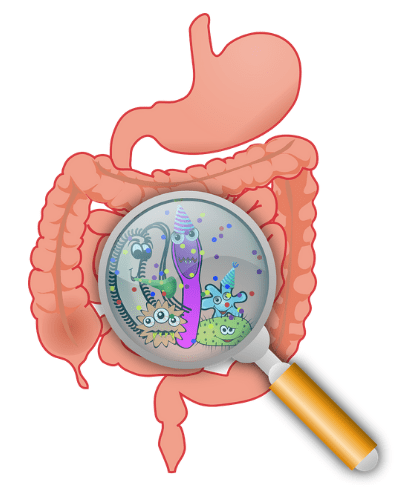
The gut is so influential that it’s considered your “second brain.” The “gut” is located in the digestion system. Digestion begins in your mouth as soon as food or drink is introduced, goes through your stomach, and all the way through the small and large intestines. The stomach helps to break down food so that once it reaches the small intestine, nutrients can be absorbed into the blood stream, and then it moves through the large intestine where waste products are eliminated.
The gut “microbiome” is a pocket that is located at the junction of your large and small intestine. This pocket is called the cecum, and contains the collective which consists of trillions of bacteria, fungi, amino acids, proteins, and viruses, all which contain genes. As a new born baby, the genes in your microbiome are those which you’ve inherited from your mother. As you grow older, what you eat largely affects and changes your biome so that it’s unique to you.
While it’s impossible to control the genes that you are born with, YOU can alter the genetic make up in your gut through diet and lifestyle modification. Many factors affect gut health, but the most important is food that you eat. Think of your gut as if it is your very own ecosystem; the more diverse the contents, the healthier it will be. Some types of flora are beneficial but others can be harmful. For optimal health and a strong immune system, the good should outnumber the bad. Gut bacteria and other flora produce vitamins, nutrients, and neurotransmitters which can affect your overall health in many different ways. The gut’s role includes things such as:
- Digestion of food
- Communication with your immune system
- Nutrient absorption
- Producing essential vitamins
- Protection against pathogen overgrowth
- Regulating intestinal mucosal barriers
The healthy bacteria communicate with your immune system so it will know when it’s time to attack foreign invaders such as harmful bacteria, viruses, and other unhealthy pathogens. The microbiome is a constantly changing, living organism that reacts to all kinds of stimuli such as what you drink, the food you eat, medications, exercise, sleep, and stress levels. The healthy flora act as the protectors from the outside environment, and help to prevent you from getting sick and/or developing chronic diseases. The stronger the gut flora are, the better your immune system is going to function.
Call our New Patient Coordinator to get all your questions answered.
817-539-6168
Or fill in the inquiry form below and tell us the best way to reach you.
Leaky Gut Syndrome
There is a strong, permeable barrier that lines the intestinal wall which controls what’s able to pass through to the blood stream. It’s permeable so that water and nutrients can be absorbed into the body. This lining is made up of epithelial cells which form this intestinal mucosal barrier. Not only does it allow nutrients to pass through, but the lining also helps to prevent harmful substances or toxins to get into the blood stream. Leaky Gut, which is also referred to as Increased Intestinal Permeability, occurs when the tight junctions in the intestinal wall become compromised and loosen. This creates minute spaces in the wall barrier which makes it possible for toxins, partially digested food particles, and harmful viruses and bacteria to cross over and enter the blood stream. Increased Intestinal Permeability triggers an inflammation response as the immune system launches an attack on anything it considers to be a foreign invader. When the immune system is triggered, the resulting inflammation can not only weaken a person’s immunity, but it can also cause it to go into overdrive and begin attacking things in the body that it shouldn’t, which in turn can cause autoimmune diseases such as:
- Hashimoto’s Disease
- Irritable Bowel Syndrome
- Type 1 Diabetes
- MS
- Inflammatory Bowel Disease
- Crohn’s Disease
- Celiac Disease
- Chronic Fatigue Syndrome
- Fibromyalgia
- Rheumatoid Arthritis
Emerging research suggests that imbalances within the gut microbiome can also create more of a risk factor for inflammatory responses which can lead to heart disease and some cancers.
Gut Dysbiosis
There are numerous factors which can create imbalances in the gut flora; Leaky Gut can occur when the gut is chronically imbalanced. The good news is that the biggest influencer of your gut health is you! Diet, medications, the lifestyle you lead – these are all things that control balance in your gut microbiome. Whatever you feed your gut influences which bacteria and other flora thrive. If you are overloading your body with unhealthy foods, drinks, or medications, the harmful bacteria are going to become more plentiful, thus potentially leading you down a road of suboptimal health. On the other hand, if you’re feeding your gut healthy foods, the beneficial flora are going to thrive and your immune system is going to get stronger which will help to keep you protected against acute illness and/or chronic diseases. Things that can negatively disrupt the gut microbiome include:
- Foods high in sugar
- Unhealthy fats
- Antibiotics (These are designed to kill most all bacteria, not just what’s harmful)
- Chronic NSAID use (these are anti-inflammatory drugs such as Advil and Motrin. Not only do they contribute to gut dysbiosis, but can also directly damage the digestive tract and intestinal lining)
- Immuno-suppressant and chemotherapy medications
- Birth control pills
- Foods containing gluten (An inflammatory food)
- Sedentary lifestyle
- Alcohol or drug abuse
- High physical, mental, or emotional stress levels (The gut communicates to the brain via the gut-brain axis, and vice versa, via the vagal nerve. Stress also triggers the body to produce more cortisol which can cause the digestive system to all but shut down. Any type of stress can cause dysfunction which will in turn, affect the intestinal microbiota.)
- Artificial sweeteners
- Imbalanced hormones to include thyroid and insulin
- Obesity
- Illness
- Emotional and physical trauma
- Sleep deprivation
In many cases, the first clue that your gut is unhealthy is that digestive issues will start to occur. You may begin to feel fatigue, and your hormones will get out of balance. You may also start to develop food insensitivities and/or allergies, which you may not causally relate to gut health since food insensitivities can trigger varying symptoms that occur in other parts of the body. The gut is linked to just about every biological process in the human body including brain function, liver and kidney function, the adrenal response, immunity, digestion, and the endocrine system. When the gut-brain axis is disrupted, things such as mood, sleep, memory, and cognition can become impaired.
Ways to Restore Gut Health

- Change your diet. One study shows that improving the type of food that you eat can make a difference in as soon as 24 hours. Food is a major factor in promoting the growth of good or harmful bacteria in the gut. Bad bacteria feed off of processed foods which contain high amounts of sugar and bad fats. Conversely, whole, unprocessed foods (especially ones containing fiber) have been shown to improve the balance of good bacteria.
- Make sure that you are taking a good probiotic supplement. This adds beneficial bacteria to the gut microbiome.
- Avoid antibiotics unless absolutely necessary since they wipe out a serious amount of good bacteria in your gut (in addition to killing the bad bacteria), leaving you more vulnerable to allow yeast and harmful bacteria to invade.
- Avoid taking NSAIDs unless absolutely necessary. Studies show that these types of drugs (Advil, Motrin) can alter your gut bacteria in only 24 hours.
- Avoid taking proton pump inhibitor drugs for heartburn and other digestive issues. These types of drugs inhibit the production of stomach acid which is vital to proper breakdown of food before it enters the intestines. There are natural ways to deal with acid reflux, including changing your diet and when needed drinking a glass of water with a teaspoon of baking soda.
- Eat probiotic-rich foods such as fermented veggies, kefir, kimchi, and sauerkraut as these contain live, healthy bacteria.
- Exercise – one of the benefits of exercise is that it reduces the inflammatory responses that occur within the body and can reduce the effects of mental and physical stress.
- Manage stress – stress can be mental, emotional, and physical. Lifestyle choices such as the foods you eat or how much sleep you get can burden the body with excess stress which can contribute to disease.
- Get enough sleep – numerous research studies have shown that not getting enough sleep can contribute exponentially to stress and the inability to deal with it. Lack of sleep also has a direct effect on gut health.
The connections between your health and your gut are undeniable. Fortunately, Dr. Berutti is an expert on gut health. With her guidance, you can get to the root causes of your symptoms and imbalances and get those corrected so that you can be your healthiest self!
Nutritional Testing at the Dynamic Life Health Center
At the Dynamic Life Health Center, we offer the following testing for gut health:
- Genova Food Allergy Test – this is a blood test which will determine if you have allergies or sensitivities to hundreds of common foods which may be linked to the activation of your immune system. Some symptoms that you may experience if you have food allergies are digestive disorders, migraines, chronic fatigue, joint and muscle aches, obesity, and skin issues such as rashes.
- Genova Small Intestine Bacteria Overgrowth Test (SIBO) – this is a simple breath test which measures exhaled hydrogen and methane gasses after ingestion of a lactose solution. Patients who have SIBO often experience abdominal pain, diarrhea, constipation, and gas. SIBO is associated with IBS, IBD, Celiac Disease, Type 2 Diabetes, Fibromyalgia, Parkinson’s Disease, and Obesity.
- Genova GI Effects Test– this is a stool test that looks at overall gut health, the function of your digestive system, inflammation, and imbalances within the microbiome, including an analysis of bacteria, yeast and parasites.
- Spectracell ™Micronutrient Test – this test evaluates 35 different nutrients to include vitamins, minerals, amino acids, and antioxidants to determine deficiencies.
Contact our New Patient Coordinator for more information
When many patients come to see us, they have lost hope because they’ve felt unwell for so long and don’t see any light at the end of the tunnel. It’s rewarding as a practitioner to be able to help so many people realize a much better “normal” and a regained sense of vitality!
Please call us to get more information about how our clinic and Dr. Berutti can help you with your health goals and to schedule an appointment.
We look forward to the opportunity to restore your health and regain your vitality for life!
For More Information Call Us at 817-539-6168
Or fill in the inquiry form below and tell us the best way to reach you.
Contact
"*" indicates required fields
